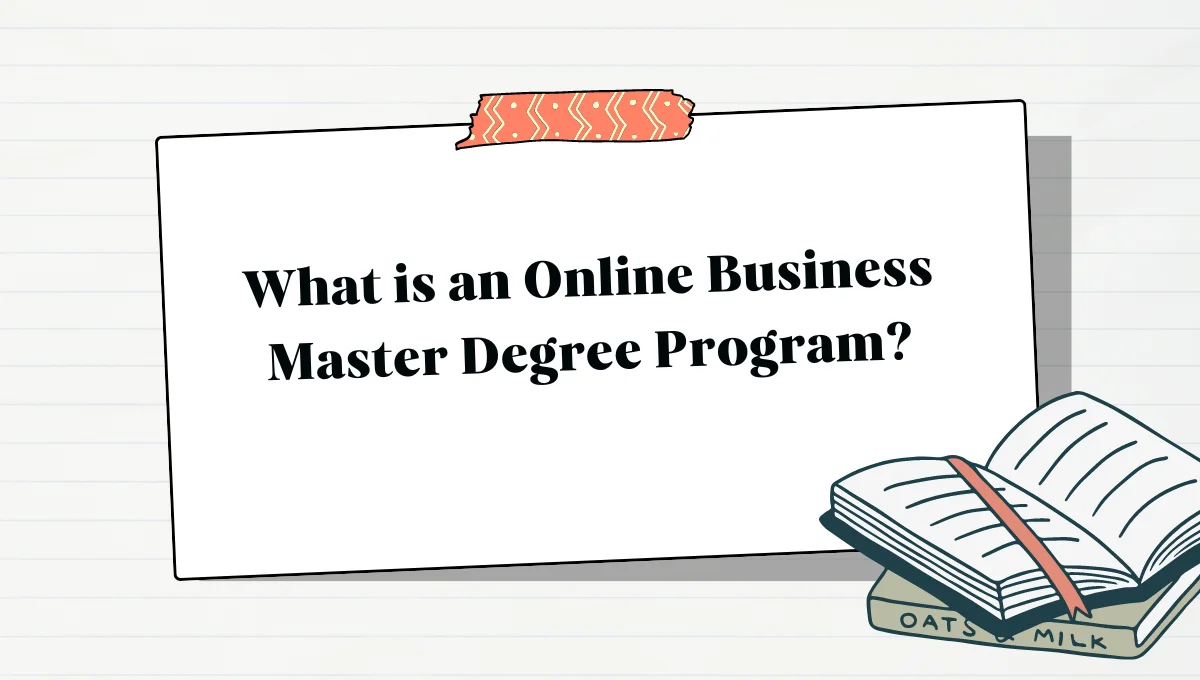Introduction
In today’s fast-paced world, advancing your career often means furthering your education. For many, this means pursuing a master’s degree in business. But with busy schedules and geographic limitations, traditional in-person programs aren’t always feasible. This is where online business master degree programs come into play, offering flexibility and accessibility like never before.
Definition and Scope
An online business master degree program is a postgraduate program that provides advanced education in various business disciplines through a virtual platform. These programs cover the same rigorous curriculum as their on-campus counterparts, but they are delivered entirely online.
Differences from Traditional Programs
Unlike traditional programs, online business master’s degrees allow students to learn from anywhere in the world, often at their own pace. This flexibility makes it easier for working professionals and those with other commitments to advance their education without putting their lives on hold.
Advantages of Pursuing an Online Business Master’s Degree
Flexibility and Convenience
One of the biggest advantages of online business master’s programs is the flexibility they offer. You can attend classes from the comfort of your home, manage your own study schedule, and balance work, life, and education more effectively.
Cost-Effectiveness
Online programs can be more cost-effective than traditional ones. You save on commuting, housing, and sometimes even on tuition. Many universities offer lower rates for their online courses compared to on-campus classes.
Access to Global Resources
Online programs often provide access to a wealth of global resources, including virtual libraries, webinars, and networking opportunities with professionals worldwide. This global exposure can be invaluable in today’s interconnected business environment.
Types of Online Business Master Degrees
MBA (Master of Business Administration)
The MBA is one of the most popular business degrees, focusing on a broad range of business disciplines including management, finance, marketing, and operations.
M.S. in Business Analytics
This program focuses on data analysis and its application in business decision-making. It’s ideal for those looking to enter fields like data science or business intelligence.
M.S. in Marketing
An M.S. in Marketing covers advanced marketing strategies, consumer behavior, and digital marketing. It’s perfect for those aiming to lead in marketing and advertising sectors.
M.S. in Finance
This degree delves into advanced financial concepts, including investment strategies, financial planning, and risk management. It’s suited for those pursuing careers in finance and investment banking.
Top Universities Offering Online Business Master’s Degrees
Harvard Business School Online
Harvard Business School Online offers various online business programs that carry the prestige of the Harvard name, providing top-tier education and networking opportunities.
University of Florida
The University of Florida offers a highly ranked online MBA program known for its flexibility and rigorous curriculum.
University of North Carolina
UNC offers a range of online business master’s degrees, including an MBA, known for its strong alumni network and career services.
Indiana University
Indiana University’s Kelley School of Business offers an online MBA that is consistently ranked among the best in the nation.
Curriculum and Coursework
Core Subjects
Core subjects in online business master’s programs typically include management, finance, marketing, operations, and strategy.
Elective Courses
Students can choose from a variety of electives to tailor their education to their career goals. Electives might include entrepreneurship, international business, or digital marketing.
Capstone Projects
Many programs culminate in a capstone project, where students apply what they’ve learned to real-world business problems, often in collaboration with industry partners.
Admission Requirements
Academic Qualifications
Most programs require a bachelor’s degree in business or a related field. However, some programs accept students from diverse academic backgrounds.
Work Experience
Many online business master’s programs prefer or require applicants to have relevant work experience. This helps ensure that students can apply practical knowledge to their studies.
GMAT/GRE Scores
Standardized test scores like the GMAT or GRE are often required, although some programs offer waivers based on work experience or previous academic performance.
Personal Statement and References
Applicants usually need to submit a personal statement outlining their career goals and motivations for pursuing the degree, along with references from professional or academic contacts.
How to Choose the Right Program for You
Accreditation
Ensure the program is accredited by a recognized accrediting body, which guarantees the quality and credibility of the education you will receive.
Specializations
Look for programs that offer specializations aligned with your career goals. Specializations can provide focused knowledge and skills in areas like finance, marketing, or entrepreneurship.
Faculty Expertise
Research the faculty’s expertise and experience. Professors with industry experience can provide valuable insights and real-world perspectives.
Alumni Network
A strong alumni network can offer significant advantages in terms of networking, mentorship, and job opportunities post-graduation.
Career Opportunities After Graduation
Job Prospects
Graduates of online business master’s programs can pursue a wide range of careers, including roles in management, consulting, finance, marketing, and operations.
Salary Expectations
Salaries for graduates can vary widely based on the industry, location, and specific role, but advanced degrees typically lead to higher earning potential.
Potential Employers
Potential employers include multinational corporations, startups, government agencies, and non-profit organizations. The degree opens doors to leadership and specialized roles in various sectors.
Challenges of Online Learning
Time Management
Balancing studies with work and personal commitments can be challenging. Effective time management is crucial to succeed in an online program.
Technical Issues
Online learning requires reliable internet access and familiarity with digital tools. Technical issues can disrupt learning and require proactive solutions.
Limited Face-to-Face Interaction
While online programs offer virtual interaction, some students might miss the face-to-face interaction and networking opportunities available in traditional settings.
Tips for Success in an Online Business Master’s Program
Stay Organized
Use calendars, to-do lists, and project management tools to keep track of assignments and deadlines.
Engage Actively in Online Discussions
Participate actively in online forums and discussions to enhance your learning experience and connect with peers.
Network with Peers and Professors
Take advantage of networking opportunities provided by the program. Building relationships with peers and professors can lead to valuable professional connections.
Utilize University Resources
Make use of available resources such as virtual libraries, career services, and academic advising to support your educational journey.
Financial Aid and Scholarships
Types of Financial Aid
Financial aid options include loans, grants, and work-study programs. Many universities also offer specific scholarships for online students.
How to Apply for Scholarships
Research and apply for scholarships early. Tailor your applications to highlight your achievements and how the scholarship will help you achieve your career goals.
Tips for Reducing Costs
Consider employer tuition assistance programs, study part-time while working, and look for cost-effective online programs to minimize expenses.
Technological Tools for Online Learning
Learning Management Systems
Platforms like Blackboard, Canvas, and Moodle facilitate course delivery, assignment submission, and communication.
Virtual Classrooms
Tools like Zoom and Microsoft Teams enable real-time interaction between students






